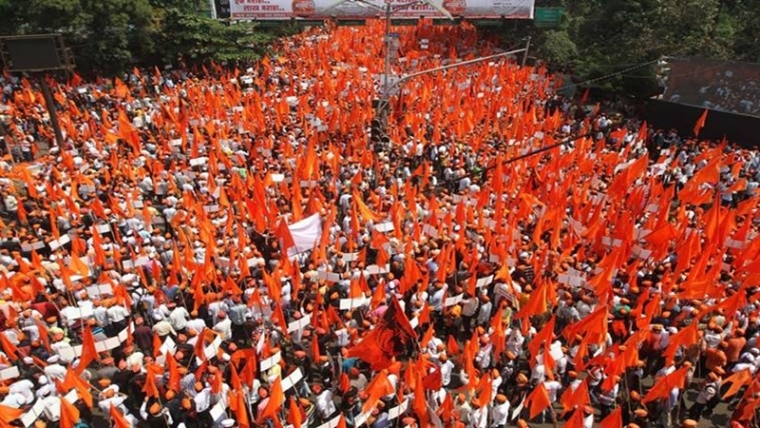श्री दुर्गा अष्टोत्तर शतनाम स्तोत्र (अष्टोत्तर शतनामावली) दुर्गा सप्तशती के अंतर्गत एक मन्त्र है, यह स्तोत्र देवी भगवती के 108 नामों का वर्णन करता है. भगवान् शिव ने इन 108 नामों की व्याख्या की है (इन नामों का अर्थ बताया है).
Benefits of 108 names of Durga- भगवान शिव कहते हैं कि जो इन नामों का पाठ करता है या जो इनका मात्र श्रवण कर लेता (सुन लेता) है, भगवती दुर्गा उस व्यक्ति पर प्रसन्न हो जाती हैं और उसका कल्याण करती हैं.
जो भी व्यक्ति देवी का निश्छल मन से ध्यान करके इस स्तोत्र के द्वारा पूजन करता है, वह निश्चय ही सिद्धि को प्राप्त होता है और उसे धन-धान्य, सभी पुरुषार्थ प्राप्त होते हैं.
यहाँ दुर्गा देवी 108 नामों का हिंदी अर्थ सहित (lyrics) वर्णन किया गया है-
ॐ
श्री दुर्गायै नमः
श्री दुर्गायै नमः
श्रीदुर्गाष्टोत्तरशतनामस्तोत्रम्
ईश्वर उवाच
शतनाम प्रवक्ष्यामि शृणुष्व कमलानने ।
यस्य प्रसादमात्रेण दुर्गा प्रीता भवेत् सती ।1।
ॐ सती साध्वी भवप्रीता भवानी भवमोचनी ।
आर्या दुर्गा जया चाद्या त्रिनेत्रा शूलधारिणी ।२।
पिनाकधारिणी चित्रा चण्डघण्टा महातपाः ।
मनो बुद्धिरहंकारा चित्तरूपा चिता चितिः ।३।
सर्वमन्त्रमयी सत्ता सत्यानन्दस्वरूपिणी ।
अनन्ता भाविनी भाव्या भव्याभव्या सदागतिः।४।
शाम्भवी देवमाता च चिन्ता रत्नप्रिया सदा ।
सर्वविद्या दक्षकन्या दक्षयज्ञविनाशिनी ।५।
अपर्णानेकवर्णा च पाटला पाटलावती ।
पट्टाम्बरपरीधाना कलमञ्जीररञ्जिनि ।६।
अमेयविक्रमा क्रूरा सुंदरी सुरसुन्दरी ।
वनदुर्गा च मातङ्गी मतङ्गमुनिपूजिता ।७।
ब्राम्ही माहेश्वरी चैन्द्री कौमारी वैष्णवी तथा ।
चामुंडा चैव वाराही लक्ष्मीश्च पुरुषाकृतिः।८।
विमलोत्कर्षिणी ज्ञाना क्रिया नित्या च बुद्धिदा ।
बहुला बहुलप्रेमा सर्ववाहनवाहना ।९।
निशुम्भशुम्भहननी महिषासुरमर्दिनी।
मधुकैटभहन्त्री च चण्डमुण्डविनाशिनी ।१०।
सर्वासुरविनाशा च सर्वदानवघातिनी ।
सर्वशास्त्रमयी सत्या सर्वास्त्रधारिणी तथा।११।
अनेकशस्त्रहस्ता च अनेकास्त्रस्य धारिणी ।
कुमारी चैककन्या च कैशोरी युवती यतिः।१२।
अप्रौढ़ा चैव प्रौढ़ा च वृद्धमाता बलप्रदा ।
महोदरी मुक्तकेशी घोररूपा महाबला ।१३।
अग्निज्वाला रौद्रमुखी कालरात्रिस्तपस्विनी ।
नारायणी भद्रकाली विष्णुमाया जलोदरी ।१४।
शिवदूती कराली च अनंता परमेश्वरी ।
कात्यायनी च सावित्री प्रत्यक्षा ब्रम्हवादिनी ।१५।
य इदं प्रपठेन्नित्यं दुर्गानामशताष्टकम ।
नासाध्यं विद्यते देवि त्रिषु लोकेषु पार्वति ।१६।
धनं धान्यं सुतं जायां हयं हस्तिनमेव च ।
चतुर्वर्गं तथा चांते लभेन्मुक्तिं च शास्वतीम ।१७।
कुमारीं पूजयित्वा तु ध्यात्वा देवीं सुरेश्वरीम् ।
पूजयेत परया भक्त्या पठेन्नामशताष्टाकम्।18।
तस्य सिद्धिर्भवेद् देवि सर्वैः सुरवरैरपि ।
राजानो दासतां यान्ति राज्यश्रियमवाप्नुयात् ।19।
गोरोचनालक्तकुङ्कुमेन सिन्दूरकर्पूरमधुत्रयेण ।
विलिख्य यन्त्रं विधिना विधिज्ञो भवेत् सदा धारयते पुरारिः ।20।
भौमावस्यानिशामग्रे चन्द्रे शतभिषां गते।
विलिख्य प्रपठेत् स्तोत्रं स भवेत् सम्पदां पदम् ।21।
इति श्री विश्वसारतन्त्रे दुर्ग्राष्टोत्तरशतनामस्तोत्रं सम्पूर्णम्
Also read: Durga Saptashati All Stotras
108 Names of Durga, Meaning-
शंकरजी पार्वती जी से कहते हैं-
श्लोक 1- कमलानने! अब मैं अष्टोत्तरशतनाम का वर्णन करता हूँ, सुनो; जिसके प्रसाद (पाठ या श्रवण)- मात्र से परम साध्वी भगवती दुर्गा प्रसन्न हो जाती हैं.
श्लोक 2- ॐ सती, साध्वी, भवप्रीता (भगवान् शिव पर प्रीति रखने वाली), भवानी, भवमोचनी (संसार बंधन से मुक्त करने वाली), आर्या, दुर्गा, जया, आद्या, त्रिनेत्रा, शूलधारिणी.
श्लोक 3- पिनाकधारिणी (शिव का त्रिशूलधारण करने वाली), चित्रा, चंडघंटा (प्रचंड स्वर से घंटानाद करने वाली), महातपा (भारी तपस्या करने वाली), मन (मनन-शक्ति), बुद्धि (बोधशक्ति), अहंकारा (अहंता का आश्रय), चित्तरूपा, चिता, चिति (चेतना).
श्लोक 4- सर्वमंत्रमयी, सत्ता (सत्-स्वरूपा), सत्यानन्दस्वरूपिणी, अनंता (जिनके स्वरुप का कहीं अंत नहीं), भाविनी (सबको उत्पन्न करने वाली), भाव्या (भावना और ध्यान करने योग्य), भव्य (कल्याणरूपा), अभव्या (जिससे बढ़कर भव्य कहीं नहीं है), सदागति.
श्लोक 5- शाम्भवी (शिवप्रिया), देवमाता, चिंता, रत्नप्रिया, सर्वविद्या, दक्षकन्या, दक्षयज्ञविनाशिनी
श्लोक 6- अपर्णा (तपस्या के समय पत्ते को भी न खाने वाली), अनेकवर्णा (अनेक रंगों वाली), पाटला (लाल रंग वाली), पाटलावती (गुलाब के फूल या लाल फूल धारण करने वाली), पट्टाम्बरपराधीना (रेशमी वस्त्र पहनने वाली), कमलमंजीर-रंजनी (मधुर ध्वनि करने वाले मंजीर को धारण करके प्रसान रहने वाली)
श्लोक 7- अमेयविक्रमा (असीम पराक्रम वाली), क्रूरा (दैत्यों के प्रति कठोर), सुंदरी, सुरसुन्दरी, वनदुर्गा, मातंगी, मतंगमुनिपूजिता.
श्लोक 8- ब्राह्मी, माहेश्वरी, ऐन्द्री, कौमारी, वैष्णवी, चामुण्डा, वाराही, लक्ष्मी, पुरुषाकृतिः.
श्लोक 9- विमला, उत्कर्षिणी, ज्ञाना, क्रिया, नित्या, बुद्धिदा, बहुला, बहुलप्रेमा, सर्ववाहनवाहना.
श्लोक 10- निशुम्भ-शुम्भहननी, महिषासुरमर्दिनी, मधुकैटभहन्त्री, चंडमुंडविनाशिनी.
श्लोक 11- सर्वासुरविनाशा, सर्वदानवघातिनी, सर्वशास्त्रमयी, सत्या, सर्वास्त्रधारिणी.
श्लोक 12- अनेकशस्त्रहस्ता, अनेकास्त्रधारिणी, कुमारी, एककन्या, कैशोरी, युवती, यति.
श्लोक 13- अप्रौढ़ा, प्रौढ़ा, वृद्धमाता, बलप्रदा, महोदरी, मुक्तकेशी, घोररूपा, महाबला.
श्लोक 14- अग्निज्वाला, रौद्रमुखी, कालरात्रि, तपस्विनी, नारायणी, भद्रकाली, विष्णुमाया, जलोदरी.
श्लोक 15- शिवदूती, कराली, अनंता (विनाशरहिता), परमेश्वरी, कात्यायनी, सावित्री, प्रत्यक्षा, ब्रम्हवादिनी.
श्लोक 16- देवी पार्वती ! जो प्रतिदिन दुर्गा जी के इस अष्टोत्तर शतनाम का पाठ करता है, उसके लिए तीनों लोकों में कुछ भी असाध्य नहीं है.
श्लोक 17- वह धन, धान्य, पुत्र, स्त्री, घोडा, हाथी, धर्मं आदि चार पुरुषार्थ तथा अंत में सनातन मुक्ति भी प्राप्त कर लेता है.
श्लोक 18- कुमारी का पूजन और देवी सुरेश्वरी का ध्यान करके पराभक्ति के साथ उनका पूजन करे, फिर अष्टोत्तरशतनाम का पाठ आरम्भ करे.
श्लोक 19- देवि! जो ऐसा करता है, उसे सब श्रेष्ठ देवताओं से भी सिद्धि प्राप्त होती है. राजा उसके दास हो जाते हैं. वह राज्यलक्ष्मी को प्राप्त कर लेता है.
श्लोक 20- गोरोचन, लाक्षा, कुंकुम, सिन्दूर, कपूर, घी (अथवा दूध), चीनी और मधु- इन वस्तुओं को एकत्र करके इनसे विधिपूर्वक यंत्र लिखकर जो विधिग्य पुरुष सदा उस यंत्र को धारण करता है, वह शिव के तुल्य (मोक्षरूप) हो जाता है.
श्लोक 21- भौमवती अमावस्या की आधी रात में, जब चन्द्रमा शतभिषा नक्षत्र पर हो, उस समय इस स्तोत्र को लिखकर जो इसका पाठ करता है, वह सम्पत्तिशाली होता है.
इस प्रकार दुर्गा अष्टोत्तर शतनाम स्तोत्र पूरा हुआ.
दुर्गा सप्तशती पुस्तक को अमेजोन से खरीदने के लिए यहाँ क्लिक करें - दुर्गा सप्तशती (मात्र 59 रूपए)
Related Posts:
Question on The Hindu Prayer-

